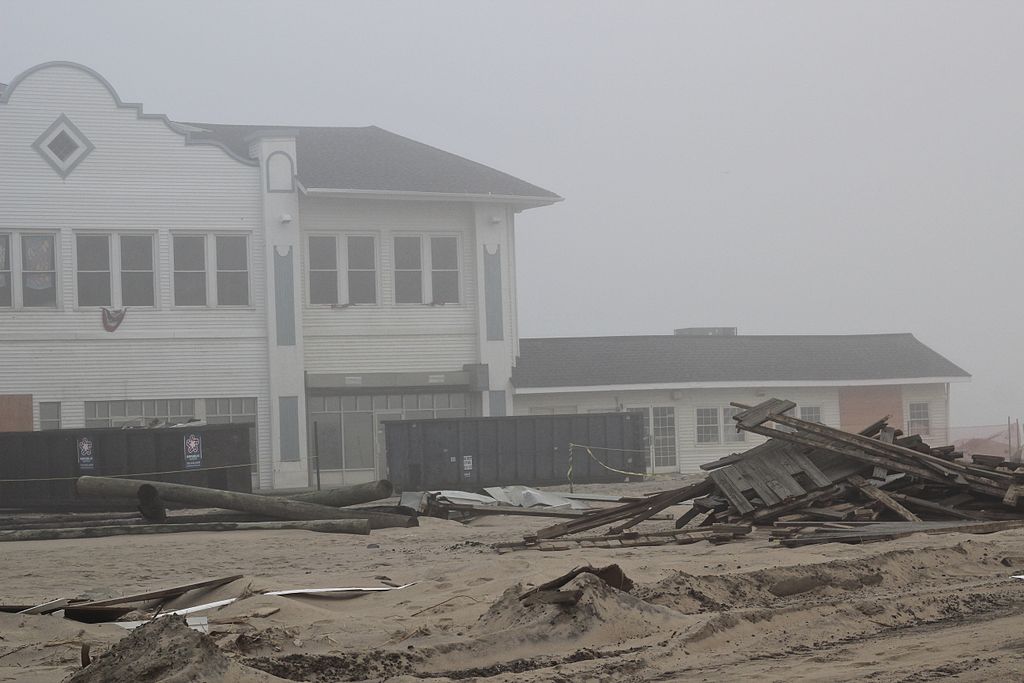The AIA Foundation (AIAF), a nonprofit philanthropic extension of the American Institute of Architects (AIA), today announced the site of AIAF’s first Regional Resilience Design Studio, funded with an initial $250,000 social impact investment by Benjamin Moore & Co.
The studio will be housed at the New Jersey Institute of Technology’s Center for Resilient Design, based in Newark, N.J. AIAF President George H. Miller, FAIA, announced the location of the Studio and the Benjamin Moore grant at the AIA’s Annual Convention, the largest gathering of the architecture community in the United States.
The Studio is the first to be launched as part of the AIA Foundation’s National Resilience Program, which plans to open a total of five Regional Resilience Design Studios nationwide in collaboration with Architecture for Humanity, and Public Architecture.
“We would like to thank Benjamin Moore for seeing the value in this effort and for continuing to be a partner with the AIA Foundation so that we can work with our partners to make communities stronger both before and after disasters,” said AIAF Executive Director Sherry-Lea Bloodworth Botop, CFRE. “Without Benjamin Moore’s leadership and commitment, this initiative wouldn’t be possible.”
“We’re thrilled to be the founding corporate partner with the AIA Foundation, Architecture for Humanity, Public Architecture and the greater design community for this landmark initiative,” said Mike Searles, President and CEO of Benjamin Moore & Co.
“Building resilient, sustainable communities is core to who we are as a company and is a part of everything we do from our innovative product portfolio to the services and color tools we provide to the broader design community,” Searles said. “We will work with the AIA Foundation to launch the National Resilience Program and provide a fresh, new approach to how architects can learn, engage and create a more resilient future.”
"Natural disasters are a real and imminent threat, and we need to find responses that examine not only where we build, but also, if we build, then how,” said Urs P. Gauchat, Dean of NJIT's College of Architecture and Design. “NJIT’s Center for Resilient Design wants to thank the AIA Foundation for this opportunity to help communities in the Northeast anticipate and recover more quickly from natural disasters."
Bloodworth Botop joined AIAF in February after serving as Senior Adviser and Director of Strategic Development for Architecture for Humanity and is responsible for all programs and activities related to the AIAF mission.
About AIA Foundation
The AIA Foundation preserves, honors and advances excellence in design for the benefit of the public. As a nonprofit philanthropic extension of the American Institute of Architects, the AIA Foundation is the preeminent voice and advocate for architecture and design in America. The AIA Foundation is dedicated to the belief that good design is good for all and plays an essential role in transforming lives and building a better world.
About Benjamin Moore & Co.
Benjamin Moore & Co., a Berkshire Hathaway company, was founded in 1883. One of North America's leading manufacturers of premium quality residential, commercial and industrial maintenance coatings, Benjamin Moore maintains a relentless commitment to sustainable manufacturing practices and continues to develop the most eco-responsible formulations possible. In 2012, the company's Natura® paint received the Green Good Housekeeping Seal, acknowledging its high degree of sustainability plus rigorously tested performance. Other superior products in the Benjamin Moore Green Promise® portfolio include Aura®, Regal® Select, ben® and Ultra Spec® 500 paint for commercial interiors – all built upon our patented Gennex® platform that has changed the industry and earned the passion and loyalty of homeowners and professional painters by delivering extremely low-VOC and peerless beauty and performance. J.D. Power and Associates 2014 Interior Paint Satisfaction Study ranked Benjamin Moore highest in consumer satisfaction, marking the fourth consecutive year and fourth time the company has earned this rating. Benjamin Moore paints deliver authentic Benjamin Moore colors and are available exclusively from Benjamin Moore's network of paint and decorating dealers.
Related Stories
Museums | Aug 11, 2010
Design guidelines for museums, archives, and art storage facilities
This column diagnoses the three most common moisture challenges with museums, archives, and art storage facilities and provides design guidance on how to avoid them.
| Aug 11, 2010
Broadway-style theater headed to Kentucky
One of Kentucky's largest performing arts venues should open in 2011—that's when construction is expected to wrap up on Eastern Kentucky University's Business & Technology Center for Performing Arts. The 93,000-sf Broadway-caliber theater will seat 2,000 audience members and have a 60×24-foot stage proscenium and a fly loft.
| Aug 11, 2010
Citizenship building in Texas targets LEED Silver
The Department of Homeland Security's new U.S. Citizenship and Immigration Services facility in Irving, Texas, was designed by 4240 Architecture and developed by JDL Castle Corporation. The focal point of the two-story, 56,000-sf building is the double-height, glass-walled Ceremony Room where new citizens take the oath.
| Aug 11, 2010
Carpenters' union helping build its own headquarters
The New England Regional Council of Carpenters headquarters in Dorchester, Mass., is taking shape within a 1940s industrial building. The Building Team of ADD Inc., RDK Engineers, Suffolk Construction, and the carpenters' Joint Apprenticeship Training Committee, is giving the old facility a modern makeover by converting the existing two-story structure into a three-story, 75,000-sf, LEED-certif...
| Aug 11, 2010
Utah research facility reflects Native American architecture
A $130 million research facility is being built at University of Utah's Salt Lake City campus. The James L. Sorenson Molecular Biotechnology Building—a USTAR Innovation Center—is being designed by the Atlanta office of Lord Aeck & Sargent, in association with Salt-Lake City-based Architectural Nexus.
| Aug 11, 2010
San Bernardino health center doubles in size
Temecula, Calif.-based EDGE was awarded the contract for California State University San Bernardino's health center renovation and expansion. The two-phase, $4 million project was designed by RSK Associates, San Francisco, and includes an 11,000-sf, tilt-up concrete expansion—which doubles the size of the facility—and site and infrastructure work.
| Aug 11, 2010
Goettsch Partners wins design competition for Soochow Securities HQ in China
Chicago-based Goettsch Partners has been selected to design the Soochow Securities Headquarters, the new office and stock exchange building for Soochow Securities Co. Ltd. The 21-story, 441,300-sf project includes 344,400 sf of office space, an 86,100-sf stock exchange, classrooms, and underground parking.
| Aug 11, 2010
New hospital expands Idaho healthcare options
Ascension Group Architects, Arlington, Texas, is designing a $150 million replacement hospital for Portneuf Medical Center in Pocatello, Idaho. An existing facility will be renovated as part of the project. The new six-story, 320-000-sf complex will house 187 beds, along with an intensive care unit, a cardiovascular care unit, pediatrics, psychiatry, surgical suites, rehabilitation clinic, and ...
| Aug 11, 2010
Colonnade fixes setback problem in Brooklyn condo project
The New York firm Scarano Architects was brought in by the developers of Olive Park condominiums in the Williamsburg section of Brooklyn to bring the facility up to code after frame out was completed. The architects designed colonnades along the building's perimeter to create the 15-foot setback required by the New York City Planning Commission.








